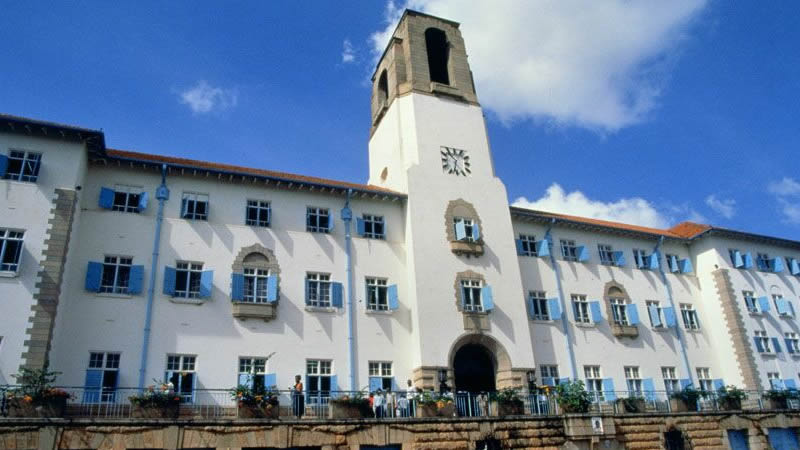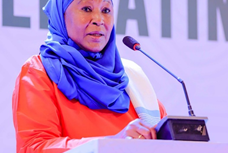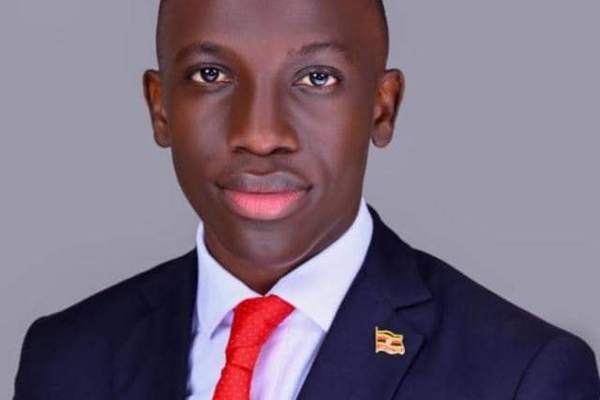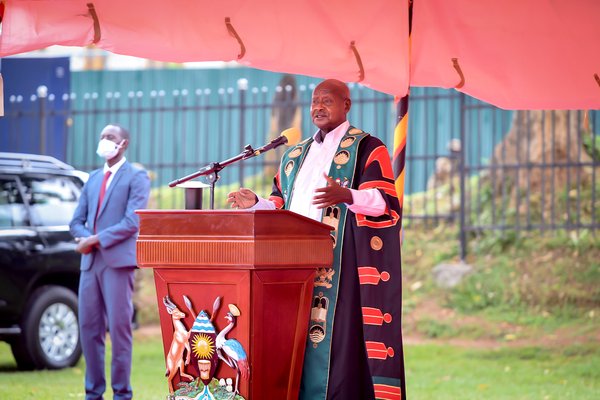By Mark Wamai
Q. What inspired you to embark on an academic journey in Literature and at what point did Makerere become part of the picture?
A. In our time, the name Makerere was ubiquitous. It was in my family, synonymous with all our much admired uncles and aunts that had made it there. While at Gayaza High School, there were also the stories about two famous professors, Nsibambi and Mamdani who were said to hold debates in the grand Main Hall that made even the chairs in the place clap. My uncles in particular had stories about their student life in the early 70s eating bread and butter at breakfast and wearing the red gown to events. Against the backdrop of the main diet of posho and beans at school because of the hard times in the 1980s, bread and butter sounded like heaven. I wanted to join to get all these privileges and also to be at the place where Ngugi wa Thiong’o had studied and [Chinua] Achebe had visited! Our Literature teachers had told us about Ngugi writing his first two novels while at Makerere. This sounded like a fairy tale to me who loved to read and listen to stories. Coincidentally in the year I joined senior one, some very beautiful, smart and very brilliant teachers came from Makerere to teach so we got role models for free.
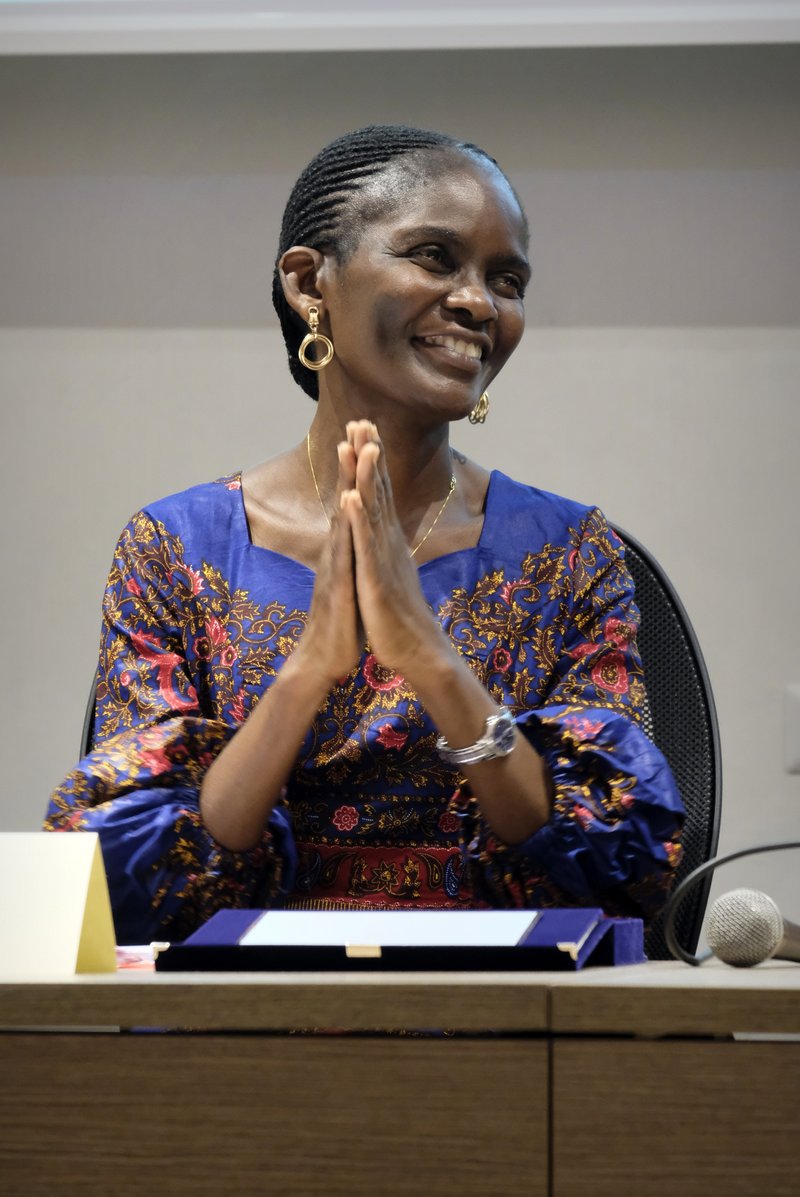
Prof. Susan Kiguli gestures in appreciation after receiving the Lifetime Achievement Award at the International Civil Poetry Festival (Photo by Antonella Sinopoli)
Q. What was your first experience of the literature class at Makerere like?
A. My first experience of the literature class was pure excitement, the kind that you can almost touch. My most memorable first class was by Prof. Timothy Wangusa reading to us from Okot p’ Bitek’s Song of Lawino. Lawino’s powerful voice was so magical to listen to especially because Prof. Wangusa explained some very interesting images in the first lines of Lawino’s protest. In my young mind, I found the whole idea of a woman challenging an impudent husband just so fascinating. Prof. Wangusa was very humorous and meticulous so I knew from the start that the Department of Literature was going to offer me a rare treat. It did not disappoint!
Q. Sounds like you got off to a flying start. What were some of your most memorable class experiences?
A. Studying literature was an adventure that made us meet people we had only read about or whose work we had discussed at secondary school. We had studied Prof. Wangusa’s poems and there he was in flesh and blood teaching us with his huge sense of humour and really tear-wrenching laugh! Then Prof. [David] Rubadiri came to teach us in our third year. Rubadiri made poetry speak. He was incredible at animating the class. He would strum imaginary guitars, dance, jump and clap. He literally had us eating out of the palm of his hand as they say. The poetry class was full to overflowing but I am always amused that Rubadiri was shocked to find out that half the class were not registered; some had come from as far as the Faculty of Agriculture to hear him teach poetry.
Q. The humour and incredibly animated classes notwithstanding, what other attributes of your lecturers left a lasting impression on you?
A. There were so many impressive and enthralling lecturers. I remember Austin Ejiet (AE) who would come to class without a single piece of paper and reel off “material”. In our curiosity we would rush to the library to crosscheck what he was teaching and it was just as the books said. His excellent teaching inspired me to read ahead of him and to read carefully all the novels he taught. He had extraordinary intellect.
I still remember the three things Abasi Kiyimba (AK) told us when he first came to our class: firstly, was that if we worked hard and made what we were admitted for at the university a priority, we would also teach like he was doing. Secondly, he said that there was room for every one of us and it was not necessary to compete against each other. The third thing was that we had come to a department with a rich heritage and that it was up to us to join the ranks of exceptional personalities that had been mentored in Lecture Room 4. He said we should actively avoid the degree they called “Mpa nejjire” literally meaning “you give me and I go” which he referred to as the pass degree. Then there was the quiet but deliberate Aloysius Kwitonda who tutored us in our first year and knew each one of us by name. Then Ernest Okello Ogwang, who we were convinced had read every literature and philosophy book in the library. There was no book you asked about that he did not know or could not quote. I was also so struck by Mary Karooro Okurut whom Prof. Wangusa called, “Mary Mother of God”. She was so practical and so generous-hearted, always with a good word of encouragement particularly for female students. We were also taught by a very young nun with a warm smile, sharp brain and she was so articulate and we all so admired Sr. [Dominica] Dipio.
It is impossible to name all the other tutors beyond the department that made a mark on me but let me say that Rhoda Nsibambi was larger than life in her influence on me. She was not only a very careful lecturer who paid attention to every student but she had a genuine and kind word for each one of us. I also hold dear Robinah Kyeyune whom I first encountered briefly at Gayaza. She knew the subject of literature like the back of her hand. Manuel Muranga, Shirley Byakutaga and Kasalina Matovu insisted that I should write my poems in Luganda. They are the reason I have laboured to teach myself to write Luganda.
Q. How did these impressions help when you made that first international trip?
A. One thing underpinned life at Makerere, a yearning to excel, to do better tomorrow than today but to also perform your tasks today. That helped a lot when I went to study for my second Masters at the University of Strathclyde. I attended Makerere at a time when the country was still struggling to recover from Amin’s time and the subsequent instability and economic crisis. We were taught to persevere and to make do with the resources we had while aiming very high. When I went to a place where the library was well stocked and resources were abundant, I told myself that I had to do better than I had done at home. The generations of the 60s that came from beyond Ugandan borders to study made Makerere the go-to place, the place to nurture unity in diversity. I remember in 1999 travelling to Tehran, Iran for a UNESCO conference and I was astounded that some people at that meeting not only knew Makerere but they asked me how Austin Bukenya was doing!! Makerere is a place that breeds greatness and so wherever one goes it is important to hold Makerere’s flag carefully and high.
Q. What did you enjoy most while at Makerere University?
A. First, being young. I think the Bible is right to say to young people to enjoy their youth, responsibly of course. It was pure fun being in Africa Hall. We had a solidarity with Livingstone Hall so we were known as Afrostone. My favourite time was jogging to the main sports ground and back while singing both the Livingstone and Africa Halls’ anthems. It was just so thrilling. I also remember the sports events and the bull roasting. I still have those beautiful photos. In sports, I used to run 3,000m but the Lumumbists never wanted us to do better than their Boxers so whenever we took to the field they would beat their drums while singing “our men, our men'' in hoarse guttural voices but that never bothered me. I knew my identity so I let them sing and I ran my heart out for the trophy but I still laugh when I remember those rowdy silly boys!!
Q. What doors have opened for you as a result of being a Makerere alumni?
A. Every opportunity that has been granted to me since I finished my first degree has everything to do with Makerere. My very first accolade at Makerere was the Uganda Association of University Women (Uganda Chapter) Award for being the best female student in the Faculty of Education (1992). The late Hon. Joyce Mpanga presided over that ceremony. This was extremely inspiring for me.
I also distinctly remember when I was selected to be on the panel of judges for the Commonwealth Writers Prize (African Region) in 1999 and traveled to Ghana. When I arrived at Kotoka Accra International Airport, I saw a gentleman with a placard with my name and University’s name on it and headed straight to him. Unconvinced by the T-shirt and jeans I was clad in, he asked me, “Are you Susan Kiguli from Makerere?” I responded with an enthusiastic nod of my head and a loud yes. He responded, “Well your CV is definitely much fatter and much older than you! I suppose when you are in Makerere, it is inevitable to achieve your goals fast!” I really had to work extra hard on that panel to live up to the expectations set up by the place I hailed from.
I must also say that being part of the founders of FEMRITE (Uganda Women Writers Association) has been such a strong supportive ladder in the pursuit of my life’s passion that is writing and performing poetry and its teaching. Our lecturer Mary Karooro Okurut came up with the idea of encouraging more girls and women to write while in the corridors of the Department of Literature. She called the first meeting to brainstorm this idea in her office just next to the famous Lecture Room 4. FEMRITE eventually became the entity that first published a collection of my poems.
As you know, on the 25th of October 2023, I was awarded the Lifetime Achievement Award for my poetry and activism by the International Civil Poetry Festival in Vercelli Italy. I was struck by the fact that in introducing me Prof. Carla Pomaré of the University of Eastern Piedmont spent time contextualizing my work by talking to the audience about the history and role of Makerere University on the African continent. The full impact of the influence of Makerere University started to become even more vivid to me. It was the same trend when I was awarded the “Ali sul Mediterraneo Libri & Cultura” International Award on 2nd December, 2023 in San Pietroa Maida, Cantazaro Southern Italy. The Organisers were very enthusiastic about Makerere University and how it has supported my life’s work.
I want to emphasise how important my scholarly heritage is to my work. Makerere is a very crucial part of my motivation and inspiration.
Q. What is the most profound thing that our current students ought to know and appreciate about Makerere?
A. Makerere is because we are. Each one of us who has been or is here is precious. We all make this place what it is. This is a great challenge and responsibility. It may sound strange to tell 19-21 year olds to take themselves seriously but I believe this is important. When I was Head of Department, there was this one student who a few weeks into his first semester took to drinking heavily. Aloysius Kwitonda and I decided to talk to this student on almost a daily basis. He of course did not finish on time but two years after his peers had left, he came back reformed and told us that we had saved his life by not giving up on him and he realised now the importance of not wasting his time. He finished up the courses he needed to complete and graduated. On the day of graduation, he came again proudly clad in his gown and thanked both of us. He said he wanted to be like that one leper that went back to thank Jesus!! He is currently doing very well. Another example is a student we could have written off is now doing her doctoral studies and is doing very well. Therefore, I think at the risk of sounding boring and preachy, I would say to our students being at Makerere is a golden opportunity, reach for it and work hard. I know without a doubt that it will pay off.
Q. What would you do differently if you were given a chance to come back as a student?
A. Ha tricky question! I would put more time in creating networks because I have realised that the friends that have been really valuable were mostly made here. There are the people that call me to give talks at their places of work and they generally provide a healthy supportive atmosphere.
I would also listen more to my lecturers because their advice has proved priceless. I still hear Rubadiri say, “Some write poetry, some write verse and others write worse- please try to write poetry!”
Related News
![]() Please join hands with the Makerere University Endowment Fund as it works towards attracting & retaining the best faculty, providing scholarships, and investing in cutting-edge research and technology.
Please join hands with the Makerere University Endowment Fund as it works towards attracting & retaining the best faculty, providing scholarships, and investing in cutting-edge research and technology.
